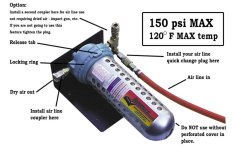Steve C
Platinum Member
SteveC, I currently work at a nuclear plant & am responsible for confined space entry program implementation, am an EMT, and a confined space rescue team leader. We are undergoing refueling outage & I've been involved with dozens of confined space permits & air samples this month, including both nitrogen and hydrogen filled spaces.
Nitrogen did kill the Midland workers, but nitrogen did not tell their brain to stop breathing. Except for long term COPD patients the body's stimulus to breath is excess CO2. Nitrogen diluted the air to the point that they lost consiousness due to lack of O2. Because they developed a relatively sudden lack of O2 they also stopped creating CO2 which is necessary to stimulate breathing.
Mixed gas divers in deep water breath as little as 2% O2 & 98% inert gas at depths of 10 atmospheres. Nitrogen is not used there because it creates a narcotic effect at about 3 atmospheres, but hydrogen & heluim, equally deadly to nitrogen, are used.
The only place I could find any reference to "one breath can kill" is the slide show you referenced. MikeD74T
Thanks Mike. Due to the fact that the amoshpere we breath is mostly Nitrogen I couldn't understand the mechanics of how it could trigger a stop breathing response that was shown in the safety film. I think they left out the part about the CO2. Or perhaps I was napping by then......
